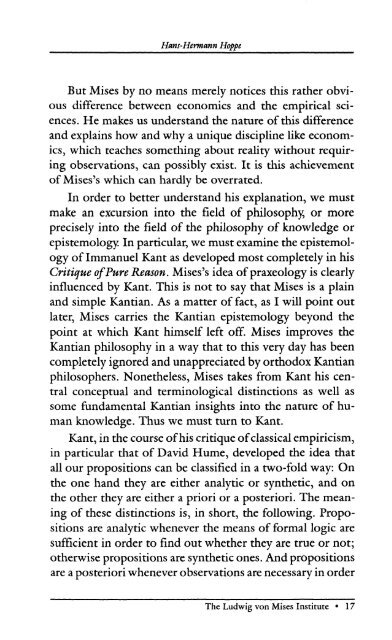Economic Science and the Austrian Method_3
Economic Science and the Austrian Method_3
Economic Science and the Austrian Method_3
- No tags were found...
Create successful ePaper yourself
Turn your PDF publications into a flip-book with our unique Google optimized e-Paper software.
Hans-Hermann HoppeBut Mises by no means merely notices this ra<strong>the</strong>r obviousdifference between economics <strong>and</strong> <strong>the</strong> empirical sciences.He makes us underst<strong>and</strong> <strong>the</strong> nature ofthis difference<strong>and</strong> explains how <strong>and</strong> why a unique discipline like economics,which teaches something about reality without requiringobservations, can possibly exist. It is this achievementof Mises's which can hardly be overrated.In order to better underst<strong>and</strong> his explanation, we mustmake an excursion into <strong>the</strong> field of philosophy; or moreprecisely into <strong>the</strong> field of <strong>the</strong> philosophy of knowledge orepistemolog~In particular, we must examine <strong>the</strong> epistemologyofImmanuel Kant as developed most completely in hisCritique ofPure Reason. Mises's idea ofpraxeology is clearlyinfluenced by Kant. This is not to say that Mises is a plain<strong>and</strong> simple Kantian. As a matter of fact, as I will point outlater, Mises carries <strong>the</strong> Kantian epistemology beyond <strong>the</strong>point at which Kant himself left off. Mises improves <strong>the</strong>Kantian philosophy in a way that to this very day has beencompletely ignored <strong>and</strong> unappreciated by orthodox Kantianphilosophers. None<strong>the</strong>less, Mises takes from Kant his centralconceptual <strong>and</strong> terminological distinctions as well assome fundamental Kantian insights into <strong>the</strong> nature of humanknowledge. Thus we must turn to Kant.Kant, in <strong>the</strong> course ofhis critique ofclassical empiricism,in particular that of David Hume, developed <strong>the</strong> idea thatall our propositions can be classified in a two-fold way: On<strong>the</strong> one h<strong>and</strong> <strong>the</strong>y are ei<strong>the</strong>r analytic or syn<strong>the</strong>tic, <strong>and</strong> on<strong>the</strong> o<strong>the</strong>r <strong>the</strong>y are ei<strong>the</strong>r a priori or a posteriori. The meaningof <strong>the</strong>se distinctions is, in short, <strong>the</strong> following. Propositionsare analytic whenever <strong>the</strong> means of formal logic aresufficient in order to find out whe<strong>the</strong>r <strong>the</strong>y are true or not;o<strong>the</strong>rwise propositions are syn<strong>the</strong>tic ones. And propositionsare a posteriori whenever observations are necessary in orderThe Ludwig von Mises Institute • 17


